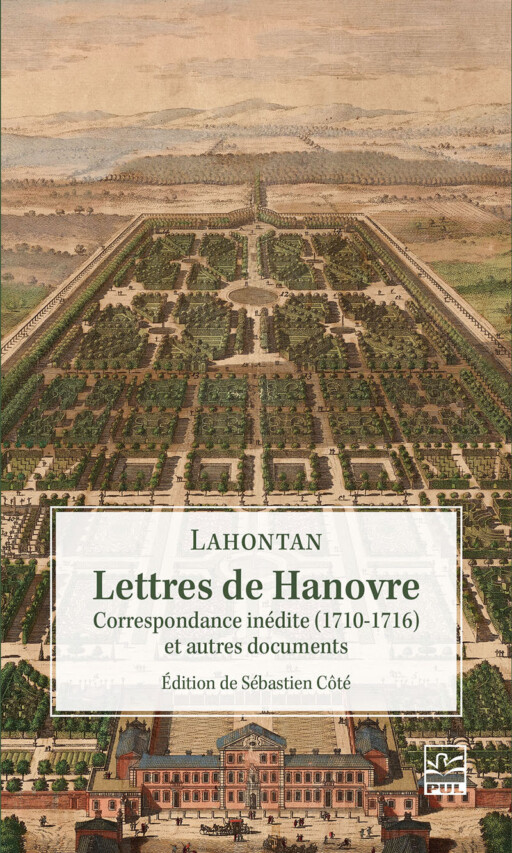Uncovering Lahontan: A Scholar’s Journey into the Life and Legacy of an Enlightenment Thinker
By Nick Ward
For many scholars, the path to some of their most defining research begins with a moment of unexpected inspiration. For Dr. Sébastien Côté, professor in the Department of French at Carleton University, such a moment came to him as a young undergraduate at Laval University when he first encountered the works of Louis-Armand de Lom d’Arce, baron de Lahontan.
What began as a university seminar introduction to Lahontan’s Dialogues avec le Huron Adario quickly evolved into a career-spanning fascination with the literature of New France (1534-1763).

“Reading Lahontan at 20 was a revelation,” Côté recalls. “I already had an interest in 18th-century literature, mostly novels, but Lahontan’s wit and modern reflections encouraged me to dig into early Canadian literature later on, yet almost imperceptibly.”
A Controversial but Crucial Figure
Lahontan, a French officer-turned-exile, became a prominent yet contentious voice of the Enlightenment. His works, which were almost immediately translated into English, German, and Dutch, greatly influenced European intellectual circles, eliciting both admiration and critique. In December 1693, Lahontan was banished from New France for his satirical songs against Jacques-François de Monbeton de Brouillan, Governor of Newfoundland. Facing the threat of legal consequences for his unabashed criticisms, Lahontan chose a self-imposed and shadowy exile in Europe. And while Lahontan’s years in New France (1683-1693) are quite well documented, much of his exile In Europe (1694-1716) has been shrouded in mystery. That is, until recently, when Côté made an unforeseen discovery.
While conducting unrelated research as a fellow at the Herzog August Bibliothek in Wolfenbüttel, Germany in 2018, Lahontan suddenly popped into the mind of Côté, perhaps because the writer and explorer had died a mere 60 kilometers from Wolfenbüttel. “Let’s give Lanhontan a try,” he recalls thinking to himself.
“Minutes later, I literally stumbled upon letters no scholar had seen before, thanks to the database of the Niedersächsisches Landesarchiv. I could hardly believe my eyes.”
These previously unknown letters uncovered by Côté span from 1707 to 1716 and offer an intimate glimpse into Lahontan’s mysterious life in exile.
They reveal Lahontan’s connections to prominent European figures, including August Wilhelm, Duke of Brunswick-Wolfenbüttel, Gottfried Wilhelm Leibniz, and King George I of Great Britain. Incredibly, they also confirmed his fluency in Spanish, a skill many researchers have long speculated but never proven. As it turns out, Lahontan was so versed in the language that he could pen clever Spanish poems. Moreover, Côté discovered that although Lahontan had been forced to move across an ocean for his ‘transgressions’, his sensibility and integrity were uninfluenced.
Côté knew he had to share his fascinating Lahontan findings with the world, so he began the process of creating his recently published book Lettres de Hanovre, which reconstructs Lahontan’s once illusory later life through this remarkable collection of correspondence. Lettres de Hanovre includes 60 letters and documents, accompanied by an in-depth introduction and over 400 footnotes that map Lahontan’s extensive intellectual network.

Collaborative Challenges and Triumphs
Transcribing the letters was thrilling for Côté, but piecing together their historical context required cross-disciplinary collaboration and patience. “I never thought I would need so many collaborators for such a short book,” Côté explains. “Some letters were in Spanish, so I needed a translator (Professor Antonio Domínguez-Leiva). My German is pretty good, but I needed historians (Professor Petra Widmer and Professor Andrey V. Ivanov) to help navigate the complexities of the German nobility in the early 18th century.”
The letters also varied in form, with some written by Lahontan himself and others meticulously copied into a leather-bound collection by Johanna Sophie, Countess of Schaumburg-Lippe.
Untangling these threads took perseverance and some specific expertise, but the result is a detailed reconstruction of Lahontan’s intellectual and personal life during a time that many historians believed had been lost.
Lahontan’s Enduring Relevance
Through Côté’s research, he concluded that Lahontan remains remarkably relevant to many persevering issues in the contemporary world. Lahontan’s writings offer a window into Enlightenment-era debates on colonialism, Indigenous governance, and religious authority. Côté understands Lahontan as someone who would be considered very dynamic and markedly progressive in his time. He was a French officer who admired Huron culture, an exile who thrived in European intellectual circles, and a writer whose sharp critiques of society remain strikingly modern. “He doesn’t fit neatly into a category,” says Côté. “He was labelled a liar and a traitor in French Canadian historiography, but the letters show a serious yet witty thinker, deeply engaged with his time.”
Additionally, Lahontan’s exile reflected broader political and cultural dynamics of the time that are important for historians and other researchers to recognize. French remained the dominant language of diplomacy and intellectual discourse across Europe, including the Hanoverian court where Lahontan spent his final years.
“The influence of Louis XIV extended far beyond France,” Côté explains. “At the Hanoverian court, there were two theatre troupes—one performing in French, the other in German. Even Leibniz and Sophia of Hanover corresponded exclusively in French.”
A Voice Rediscovered
Thanks to Côté’s Lettres de Hanovre, scholars and readers alike will now possess a more thorough understanding of the enigmatic figure of Lahontan. Lettres de Hanovre depicts not just a controversial exile but a thinker whose ideas left a lasting mark on Enlightenment discourse.
“These letters prove he was more than just a scandalous character,” says Côté. “He was respected within the German elite, remained loyal to his patrons, and resisted conversion to Protestantism with a great sense of humour. His voice deserves to be heard.”